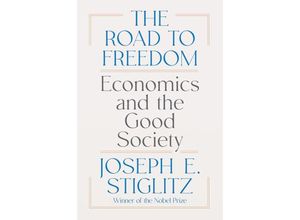We are a nation born from the conviction that people must be free. But since the middle of the
last century that idea has been co-opted. Forces on the political Right have justified
exploitation by cloaking it in the rhetoric of freedom leading to pharmaceutical companies
freely overcharging for medication a Big Tech free from oversight politicians free to incite
rebellion corporations free to pollute and more. How did we get here? Whose freedom are
we-and should we-be thinking about? In The Road to Freedom Nobel prize winner Joseph E.
Stiglitz dissects America's current economic system and the political ideology that created it
laying bare their twinned failure. "Free" and unfettered markets have only succeeded in
delivering a series of crises: the financial crisis the opioid crisis and the crisis of
inequality. While a small portion of the population has amassed considerable wealth wages for
most people have stagnated. Free and unfettered markets have exploited consumers workers and
the environment alike. Such failures have fed populist movements that believe being free means
abandoning any obligations citizens have to one another. As they grow in strength these
movements now pose a real threat to true economic and political freedom. As an economic
advisor to presidents and as chief economist at the World Bank Stiglitz has witnessed these
profound changes firsthand. As he argues the failures follow from the elites' unshakeable
dedication to "the neoliberal experiment." Explicitly taking on giants such as Friedrich Hayek
and Milton Friedman Stiglitz exposes accepted ideas about our political and economic life for
what they are: twisted visions that tear at the social fabric while they enrich the very few.
The Road to Freedom breaks new ground showing how economics-including recent advances in which
Stiglitz has played such an important role-reframes how to think about freedom and the role of
the state in a twenty-first century society. Drawing on the work of contemporary philosophers
Stiglitz explains a deeper more humane way to assess freedoms-one that considers with care
what to do when one person's freedom conflicts with another's. We must reimagine our existing
economic and legal systems and embrace forms of collective action including regulation and
investment if we are to create an innovative society in which everyone can flourish. The task
could not be more urgent and Stiglitz's latest book is essential reading for those committed
to the American ideal of an economic and political system that delivers well-being opportunity
and meaningful freedoms for all.

